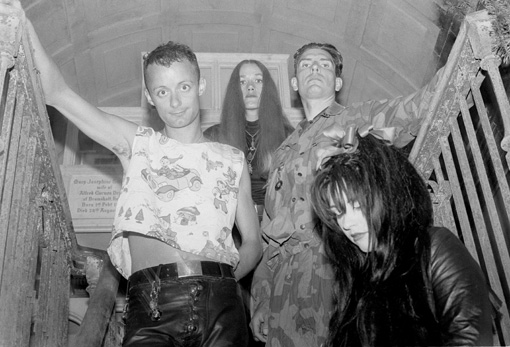The Dome, Brighton, Tues 15th Jan
One facet of Bang on a Can, the All-Stars describe themselves as: “freely crossing the boundaries between classical, jazz, rock, world and experimental music, this six-member amplified ensemble has consistently forged a distinct category-defying identity, taking music into uncharted territories.”
Last time I saw the All-Stars themselves (rather than extended family members), the programme was built around a concept - samples and field recordings. Hewing consistently to the concept led to a night which was intriguing but inconsistent musically. This time the programme was bound to no theme, and no piece was less than fully involving.
Two numbers might get classed under the general tag ‘ambient’ - Philip Glass’s ’Opening’ (from ’Glassworks’) and Brian Eno’s ’Music For Airports 1’. As a big Glass fan, and someone who mostly finds Eno’s ambient works only formally interesting, I expected to find myself favouring the first option. Added to which Eno’s work wasn’t written to be performed but constructed from tape loops. Had I been asked beforehand about the wisdom of transposing it to live musicians, I’d doubtless have said no.
Which is another reason to be glad that no-one listens to me. However much I enjoyed the Glass, the Eno most won me over. It gave off a sense of slo-mo dynamics, of suggesting it was slowly but surely building to a climax which never came. The sense of ceaseless anticipation made the piece compelling.
But, beholden to no other task, the set maxed out on variety. The closer was the invigorating’Horses of Instruction’, by British composer Steve Martland. It somehow found the perfect balance of contemporary composition with the rambunctious involving feeling of beat music, Blake’s smart horses and blazing tigers combined into one creature. The jazzy syncopated funk workout, complete with honking sax, transformed the body language of the players. As they swung and swayed along, an ensemble became a band before your eyes.
Some local stalwarts refer to ‘Old Brighton’, a bohemian spirit the town had before it was overrun with hipsters and everything became monetised. Formed in ’92, Bang On a Can seem similarly ‘old New York’, before the “Disneyland for the rich” thing, when a wide variety of people were crammed together into a few islands. The music of your neighbours would inevitably seep into your apartment, and so the natural thing to do was mix it all up.
They carry with them the all-important understanding that great music doesn’t stem from the brows of lone geniuses, in ivory tower isolation, but from collaboration and cultural cross-fertilisation. They’re not just good, they’re exemplary.
From the sublime (‘Music For Airports’ performed in an airport, with announcements added ambience…
… to the spirited! ’Horses of Instruction’, also not from Brighton…
JULIA WOLFE’S ‘ANTHRACITE FIELDS’
Bang On a Can with the BBC Singers
Kings Place, London, Sat 19th Jan
Though this new composition was by Bang On a Can co-founder Julia Wolfe and cited the All-Stars first, it’s based around the chorus. (The programme explains it was commissioned by an American choral group.) The All-Stars do nothing, or contribute quite minimally, for long periods. Not previously realising I had any preconceptions, I soon found I had to switch them off.
Like Wolfe’s earlier ‘Steel Hammer’, the work has to do with American labour history. However unlike either ‘Steel Hammer’ or ‘Cruel Sister’, it wasn’t based on folk songs but something more buried. In both senses of the word.
Anthracite was best-quality coal. Which didn’t necessarily translate into best working conditions for the guys who dug it. In the programme Wolfe explains she grew up in Pennsylvania near the mines. Yet the family car almost always turned in the opposite direction to them. Neither modern composers nor their central London audiences tend to be ex-miners, which is part of the point.
For example, the movement ’Breaker Boys’ is based on recollections ex-miner Shorty Slick gave to a documentary. My initial response was concern that transposing his words onto a choir might run a little close to speaking for someone. Why not just do the Steve Reich thing, I thought, and just run a recording of the voice? Especially when Wolfe often uses Reich’s trick of using the cadences of speech for rhythms.
But in fact, just as Slicks’s job was to sort rock from coal, the reciting chorus sorts out his feelings and leaves us with the brute facts. For example how soon you’d lose your fingernails to the work. And much of the texts used are just that - texts. Dry information, often provided in a list format. The opening movement, ’Foundation’, recites names from an index of mining accident. As Wolfe notes in the programme, “the list is sadly long”. But supplying that sadness falls to you.
And you can see how this works all the better from the time the piece does the opposite. ’Speech’ comes, as you might expect, from a speech. Given by a Miner’s Union president, on paper its involving and effective. (“If we must grind up human flesh and bones in the industrial machine that we call modern America…” is its start.)
But as performed the words are sung not by the choir but solo, in an emotive rock/folk style, which serves to rob them of their effect through over-enunciation. When an artist merely lays an idea before you, leaving you to pick it up, you’ll feel it more solidly in your hand.
Overall the work’s eclectic, inventive and compelling, ranging between ominous drone, scatting jazz and polyphonic choral music, It’s so densely packed it feels longer than its hour duration. (In, you know, a good way.) But the upside is simultaneously the downside, and it feels more uneven than ’Steel Hammer’. Mostly because of ’Speech’, but also in parts of the final movement ’Appliances’.
A short documentary on its creation…
Overall the work’s eclectic, inventive and compelling, ranging between ominous drone, scatting jazz and polyphonic choral music, It’s so densely packed it feels longer than its hour duration. (In, you know, a good way.) But the upside is simultaneously the downside, and it feels more uneven than ’Steel Hammer’. Mostly because of ’Speech’, but also in parts of the final movement ’Appliances’.
A short documentary on its creation…
Coming soon! More gig-going adventures...









